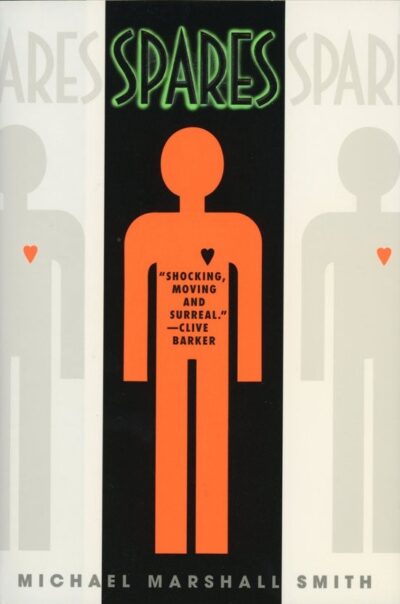By MICHAEL MARSHALL SMITH (Bantam; 1996/97)
This, the second novel by the UK’s Michael Marshall Smith, was essentially a rewrite of his first. Published in the UK in 1994 (and the US in 2000), Smith’s debut novel ONLY FORWARD featured a streetwise yet witty and self-effacing narrator traversing a bleak cyberpunk dystopia and a realm where the subconscious becomes reality, with an elusive William-Gibson-meets-Philip-K.-Dick-by-way-of-Douglas-Adams tone. All those things are evident in SPARES, which has the same major attribute of ONLY FORWARD—its uniqueness and readability—as well as its chief flaws: it’s erratically plotted and uneven.
The narrator is Jack, an ex-cop and war veteran living in a dystopian American city known as New Richmond who’s tasked with supervising a farm housing “spares.” Spares are cloned humans who exist to provide replacement body parts for their rich counterparts and are treated like degraded farm animals. Jack inevitably comes to identify with the spares and risks his livelihood to save them, which doesn’t stop these unfortunates from suffering a truly horrific collective fate.
The above, keep in mind, covers only the first third of SPARES. It’s powerful and disturbing, and bears a concept that in 1996 seemed pretty original. This was something of which Hollywood took notice, evidenced by the fact that (as the hardcover dustjacket makes sure to inform us) Dreamworks snapped up the film rights. The proposed film adaptation was never made, although aspects of SPARES “coincidentally” found their way into the Dreamworks productions MINORITY REPORT and THE ISLAND.
But getting back to the novel’s final two thirds: they pursue an entirely different path than the earlier portion. We learn of the existence of The Gap, an interdimensional region where the irrational is made concrete. It’s here that Jack did his military service (with descriptions that were clearly meant to evoke Vietnam), and where he’s destined to make a not-very-welcoming reappearance.
The aforementioned Philip K. Dick would doubtless have taken the conceptions of the spares and The Gap and run with them. Smith, however, shorts both, with the spares essentially exiting the novel after the opening third and The Gap likewise allowed to fade into the background, with the various plot strands left to be tied together in an unsatisfying denouement in which a dark figure from Jack’s past increasingly comes to dominate his present and the requisite Life Lessons are learned. No wonder Hollywood was so enamored.

